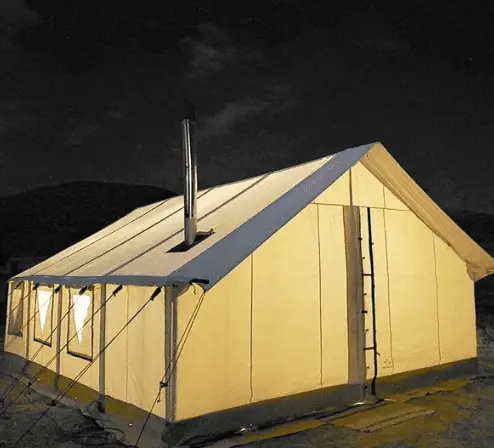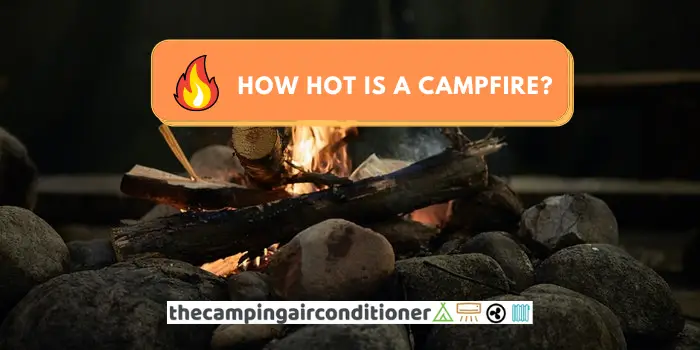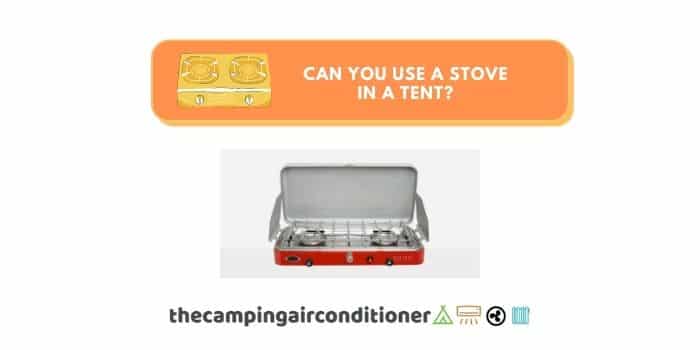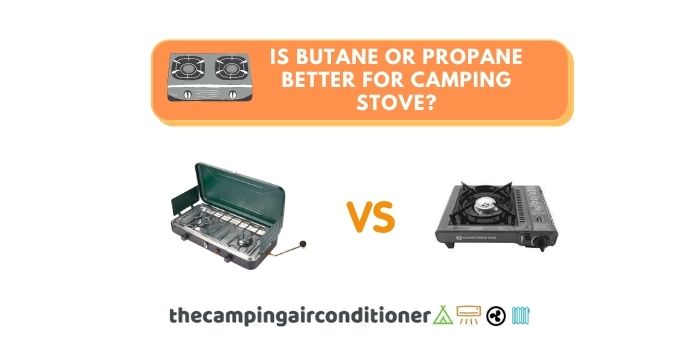The Camping Air Conditioner is sponsored by readers. When you buy through one of our links, we may earn an affiliate commission at no extra cost to you.
Camping in winter can be an excellent experience outdoors – the parks are generally less crowded, which means you are likely to have a quieter and relaxing trip.
However, as good as it is to camp without mosquitos (they are not around in cold weather), it also comes with challenges, especially when talking about keeping warm in your tent. Bringing suitable camping gear, such as a winter tent and heaters, will ensure a comfortable and enjoyable trip. But, many campers ask: What is the best tent option for cold weather – hot tents or 4 season tents?
Well, the answer is – it depends on your needs and preferences. Overall, we recommend hot tenting for trips with a large group of campers that want to share the same tent (or are looking for extra comfort and space) and are planning to camp for the medium-to-long term (i.e. more than five days) in fixed a location.
If, on the other hand, you are hiking or backpacking, hot tenting might be a hassle given the time required to set up the tent, and the woodstove might be extensive for trips that require increased mobility. Therefore, nylon and polyester tents with good insulation might be the most suitable option.
| Feature | Hot Tents | 4 Season Tent |
| Fabric | Predominantly Canvas | Predominantly Nylon and Polyester |
| Price | $$$$ | $$ |
| Capacity | Oversized models up to 18 campers (also smaller options) | Generally up to 4-5 campers |
| Mobility | Low | High |
| Setup | Generally not free-standing – Require pegs, guy ropes, etc. | Multiple Free-standing options |
| Stove Jack | Yes | No |
| Best Heating Source | Portable Wood stove | Tent Heater |
| When to Use |
|
|
Let’s discuss more details about this summary table in this article.
What is a 4 season tent?
Even though the name suggests that it is suited for camping all year round, the 4 season tents are designed for winter camping and handle temperatures below 0 Celsius degrees, including snow and high winds.
They come in different sizes, shapes, and fabrics, but generally speaking, you will find plenty of lightweight nylon and polyester models for not more than 4-5 campers. To improve performance in these harsh winter conditions, they tend to have a lower height (for better aerodynamics) and curved roofs (to avoid snow accumulation), such as NatureHike cloud-up four season for 2 and 3 campers (pic below).
Given they are made to protect you from freezing temperatures, you will note that 4 season tents come with much less meshed areas in their body and have strategic openings to provide ventilation when required.
What is a hot tent?
Hot tents are 4-season tents specifically designed to accommodate a wood-burning stove inside them and create a warm and cozy environment within your shelter.
They have stove jacks that allow for the exhaustion of fumes and smoke through a chimney, enabling the safe use of wood stoves inside it (we reviewed the best tents with stove jacks in a different article – read it here).
Generally, they are spacious tents made of canvas, and you can find them in different shapes, such as bells, walls, yurts and tipis – there are even oversized models with the capacity of up to 18 campers, such as WhiteDuck Wall Canvas Tent. Canvas is known to provide excellent insulation features, making it the best fabric for cold weather camping, even though it is heavier and more expensive than other options.
However, there are also smaller models made of nylon/polyester, such as the Tipi Hot tent with Skirt T2 for four people.

Hot tent vs 4 Season tent - When to use each?
Even though there is no rule set on the stone, overall, we recommend considering hot tenting for longer trips, where extra space is required, or you are simply after more comfort. Nylon and polyester tents are lightweight and will provide you with more mobility and flexibility with multiple free-standing options available in the market.
The table below summarises our recommendations.
| Which model should you use? | Hot Tents | 4 Season Tent |
| Medium to Long Term Camping | X | |
| Hunting | X | |
| Large Group of Campers | X | |
| Skiing and Snowmobiling | X | |
| Cooking inside a tent | X | |
| Expeditions | X | |
| Hiking | X | |
| Backpacking | X | |
| Mountaineering | X |
Which stove can I put in a hot tent?
We reviewed different models in and our recommendations is the following gear:
- Winnerwell Woodlander Large Tent Stove – Best Overall (for small to Large Tents)
You can read a detailed review of other options in this article.
Can I use a heater inside a 4-season tent?
Yes, you can. However, it would help if you were careful when using it. We recommend using an electric heater for safety reasons, but I imagine that if you are backpacking or hiking, you won’t have an electric hookup close by, right?
If that is your case, you can use a small propane heater, such as Mr Heater Little Buddy. You must put in place some critical measures to avoid carbon poisoning risks (i.e. ensure plenty of ventilation inside your tent and use a carbon monoxide detector – read more in this article).
Other tips to choose your winter tent and cold weather camping
Regardless if you are going for a hot tent or a 4 season tent option, take into consideration the following issues and aspects:
- Wind conditions: Dome tents might be better suited for camping in windy conditions, given their better aerodynamics. Conversely, Wall and Cabin tents will produce more drag, and you might face some issues during strong winds.
- Snow camping: If the weather forecast indicates snowy conditions, pick a tent with a curved roof so there is no flake accumulation over your tent.
- Insulation: Consider building an extra insulation layer by yourself with reflective foil and tarps – it is an easy and cheap solution – check this post for more details on insulating your tent for winter camping.
- Waterproofness: If possible, pick tents with Waterhead levels above 1000mm to keep you dry in case of rains
- Fabric: There is a classic trade-off here – Canvas will provide you with better insulation and breathability, but these tents are much heavier than polyester and nylon models, which will generally have better waterproofness and be more compact.






